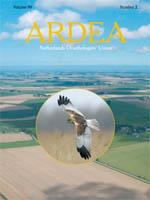In migrants that occupy and defend territories during migration, social status can determine access to preferred resources and alter stopover behaviour. The potential variation in stopover behaviour between dominant and subordinate individuals of the Northern Wheatear Oenanthe oenanthe, a territorial migrant bird species, was examined at an offshore stopover area on the island of Helgoland during the spring of 2009. Overall, territories were occupied and defended by dominant birds (identified as those that won ≥50% of the conspecific aggressive encounters). Dominant birds also initiated most conspecific aggression. Unable to settle and defend a territory, subordinates tended to be vagrant and stopped over for shorter periods of time. This is likely due to the fact that subordinates were continuously displaced by dominants, and therefore had less access to food. Subordinates also tended to forage at lower rates. Northern Wheatears were primarily found in zones with a higher number of shelters, supporting the idea that avoidance of predation plays a role in site selection.
How to translate text using browser tools
1 October 2011
Stopover Behaviour and Dominance: A Case Study of the Northern Wheatear Oenanthe oenanthe
Juan Arizaga,
Heiko Schmaljohann,
Franz Bairlein

Ardea
Vol. 99 • No. 2
October 2011
Vol. 99 • No. 2
October 2011
asymmetric contests
body size
Helgoland
migration
social status
territoriality




